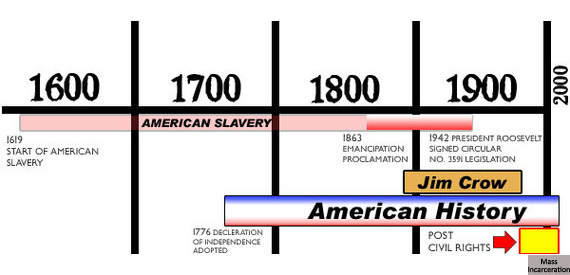As the celebration ensued, and the Oscars were handed out I found myself happy for the creators of the film 12 Years a Slave, but unresolved about the movies impact on the modern American psyche. Would this movie that limited a slave's experience to a 12-year period do a disservice to the legacy, and completeness with which American slavery actually encompassed our country's history? Last year I wrote a piece after sitting with the creators of the Roots miniseries entitled, "Slavery on Screen: Creators of Roots Discuss 12 Years and Django" In that piece, I stated:
...12 Years a Slave took a much more historically accurate view of the institution of slavery. Raw, brutal and real is how I describe it after a viewing of the film. Director Steve McQueen held no punches in detailing the atrocity of slavery. The story of Solomon Northup was captured in a detail that caught the nuance of acceptance slaves were forced to endure. Several shots were made intentionally long, forcing the viewer to sit uncomfortably and grasp how long a painful moment can stretch.
In my view McQueen's limitation was one that he could not control, time limits of a theatrical film. The format of the two-hour film sets up well for many story lines. One of those may not be slavery, which requires the viewer to get some depth of time of enslavement over generations to begin to grasp the institution. Hence why the miniseries was such a powerful format with Roots. The entire Roots saga being collectively over 28 hours aired on broadcast television, Roots (1977), 10hrs, (ABC); Roots Next Generation (1979), 14hrs, (ABC); Queen (1993), 4.5hrs, (CBS). Mark Wolper President of Wolper Productions creators of Roots states 'To do slavery in particular, and many other sections of African American history justice, you really need eight -- 10 hours to develop depth of relationships, time and context for the storyline.'
The generational reality of families that were enslaved from the early 1700s through the late 1800's spanning several generations is often chopped down to eight -- 10 minutes of back story in many films. In addition, some of the tactics used by slave masters weren't purely about violence, but rather social confusion and require a length of time and repetitiveness to unveil that cannot fit in 120 minutes. -- "Slavery on Screen: Creators of Roots Discuss 12 Years and Django"
While all respect goes to Solomon Northrup's story, my family's legacy of enslavement did not last 12 years, just like many other African Americans it set in over lifetimes. The danger of 12 years a Slave is that by not covering the generational reality of slavery it gives a false sense of completion. It allows America to have a ending to Slavery that simply is a false narrative for the mass numbers of African Americans that didn't get to leave the plantation. By not showing the aspect of lineage, you lose a core element with which American slavery was a self-fulfilling social institution of degradation. In effect it quite possibly gives an America that already receives too little of its own history, a dangerous lens of incompleteness with which to view American Slavery. I celebrate the accomplishment of this African American movie winning the Best Picture Oscar, but do so with the understanding that the celebration must be tempered so as to not lose sight of history.
America is only 236 years old, the Independence of the country was gained in 1776. While in contrast America's African slavery lasted from 1619, to at least the date used by most textbooks 1862... So in all American slavery was 'several-hundred'-years-long, being that it started before the country's independence and lasted well into its more modern existence. -- "Paula Deen, Trayvon Martin, the Shadow of Racism..."
I created the chart below to give a visual timeline to understand the length of American Slavery against American history
Over the last 30 years Americans of all walks forgot (or never learned) this country's true history, and the class/racial structure that defined it some 300+ years prior, starting well before the country's official Declaration of Independence. We were made to believe that the rich got positioned so purely as a result of effort and genius, as though America did not recently abolish the legal institution of Jim Crow, and as though Slavery's illegality became enforceable criminally well before the actual date of 1942 when President Roosevelt signed Circular No. 3591 legislation... Slavery and Jim Crow as legal institutions have legacies that not only clogged American Capitalism from being a truly fair opportunity for all, it has burdened Black America particularly with heavy social cost and chained them as a mass group to lives of struggle..."The Era Within Which American Legacy Rises"
12 Years a Slave winning the Best Picture Oscar is a major moment in cinema, but we must view this film understanding the necessity of not allowing it to be the definitive story of our history. Rather with hopes that it allows for a door to be opened to begin to seriously deal with America's long lasting legacy of enslavement on screen.
"Everyone deserves not just to survive, but to live. This is the most important legacy of Solomon Northup. I dedicate this award to all the people who have endured slavery." -- Steve McQueen Director of 12 Years a Slave
